This post may contain affiliate links. Please read our disclosure policy.
Making this English Muffin recipe isn’t difficult – your stand mixer does the kneading and you won’t spend a minute at the stovetop. It is precise, but it’s worth the effort, I promise. Take care when you make them to follow the instructions about temperatures and resting times and you’ll be rewarded with spectacular, Homemade English Muffins!
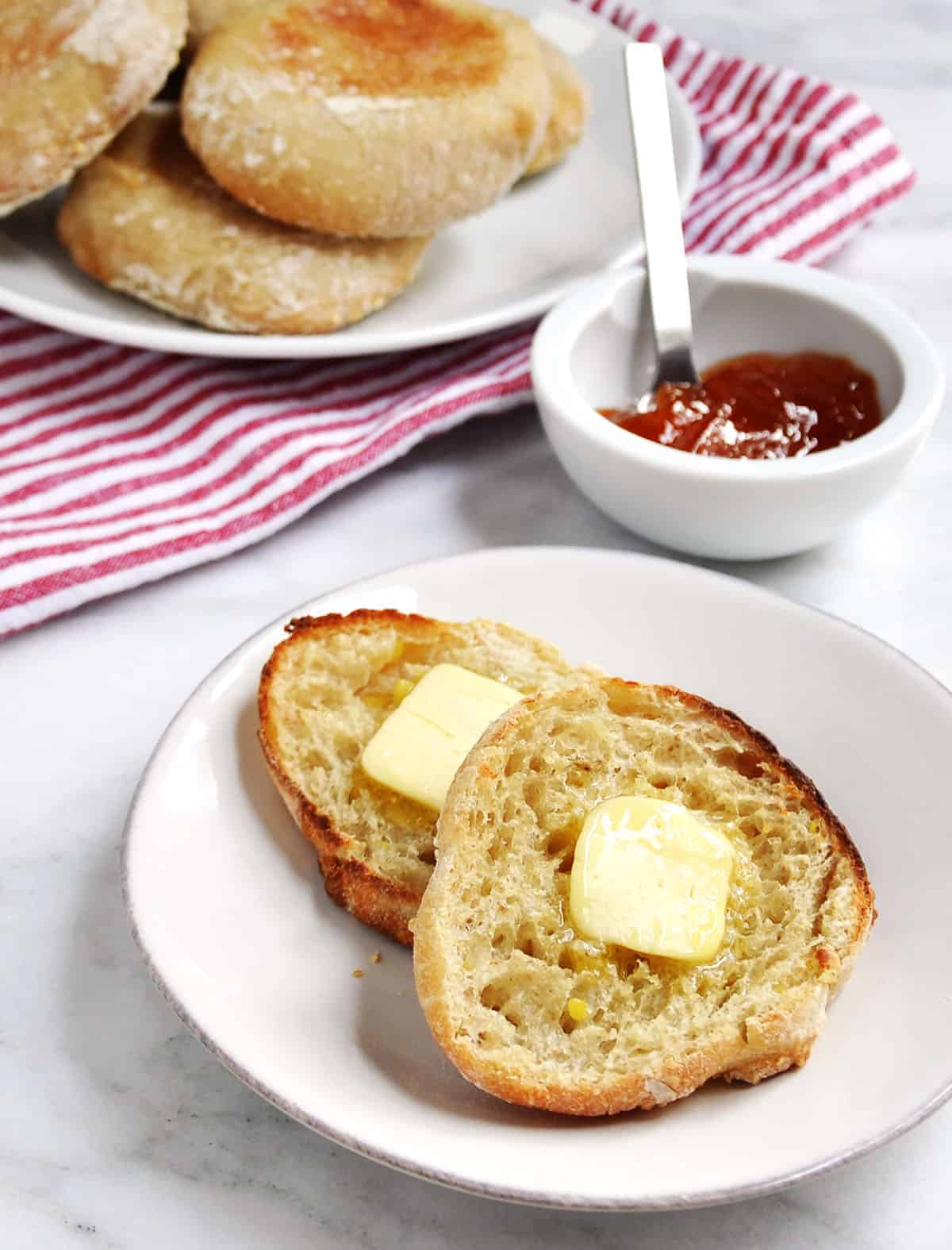
When we lived in Seattle, we started the day with a Dahlia Bakery breakfast sandwich whenever we happened to be on that end of town before 10am. Sometimes we’d arrive at 10:15 and just shuffle past the window looking forlorn.
Not really. When that happened, we’d stop in for a salad, sandwich or cookie instead.
Anyway, we fell in love with the English muffins they made for those breakfast sandwiches and, for years now, I’ve wanted to try making them at home.
There are many English muffin recipes out there, but what I love about Dahlia Bakery’s version is how light and fluffy they are – impossibly so! Yet they maintain the nooks, crannies, crunch and chew that makes an English muffin, well, an English muffin. Pop these in your toaster until crispy and slather with butter or use for your favorite breakfast sandwich or as the base for Eggs Benedict.
More Delicious Breads and Quick Breads to Try
- Easy Brioche Buns (7 ingredients and 15 minutes of active time to make feather light, buttery rich brioche buns from scratch!)
- Sweet Potato Bread (A hearty, delicious twist on the Southern classic quick bread!)
- Homemade Biscuits (Tender on the outside and oh so flaky – my tried and true recipe.)
How to Make English Muffins:
First the dough – it’s likely stickier and more pliable than most yeasted doughs you’ve worked with before.
Step 1: Once you’ve cooked, mashed and cooled your potato, you’ll mix and rest the English muffin dough and then mix again.

Step 2: Transfer dough to a large, oiled bowl and let dough rise at room temperature. You’ll rest and turn the dough a total of 4 times.

Step 3: Once the dough has risen, transfer it to a floured work surface – the dough will be soft and sticky. Then sprinkle the dough with flour.
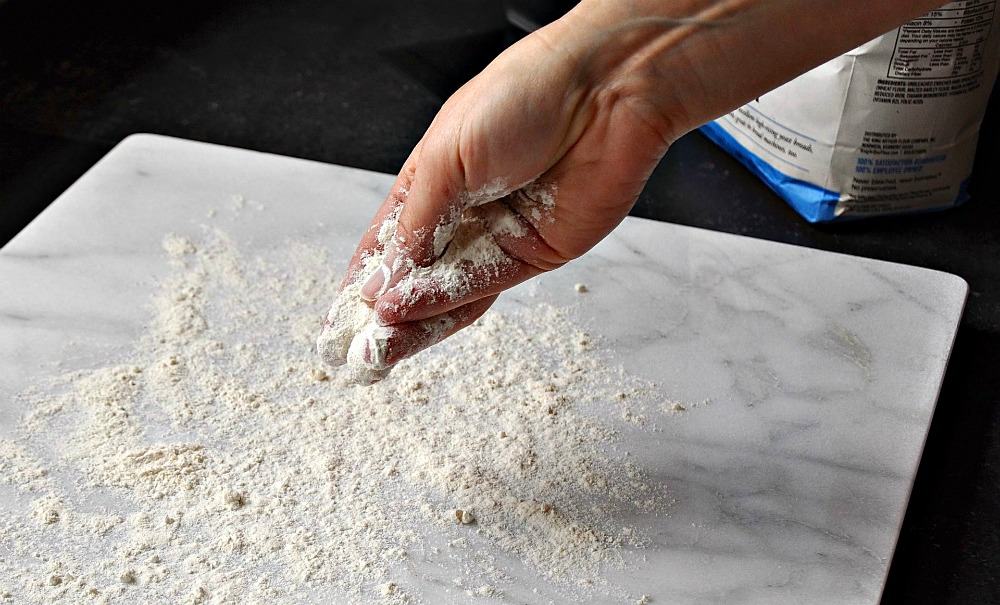
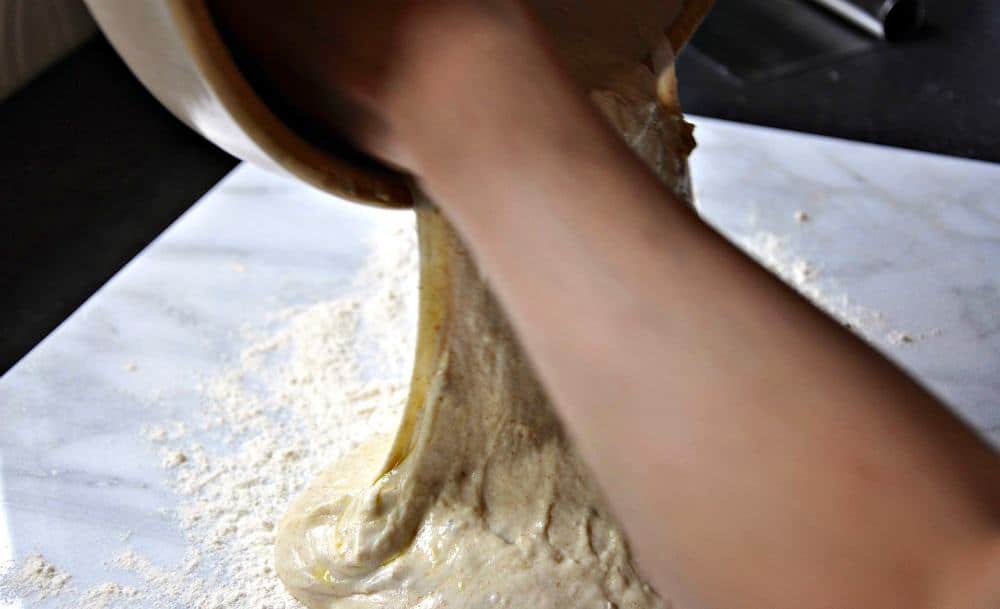
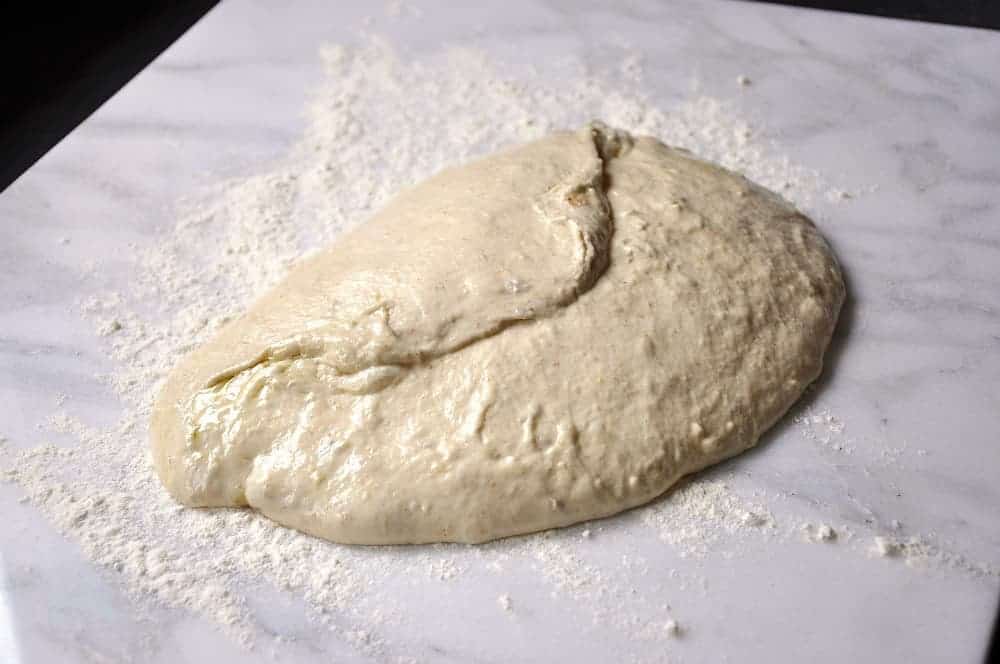
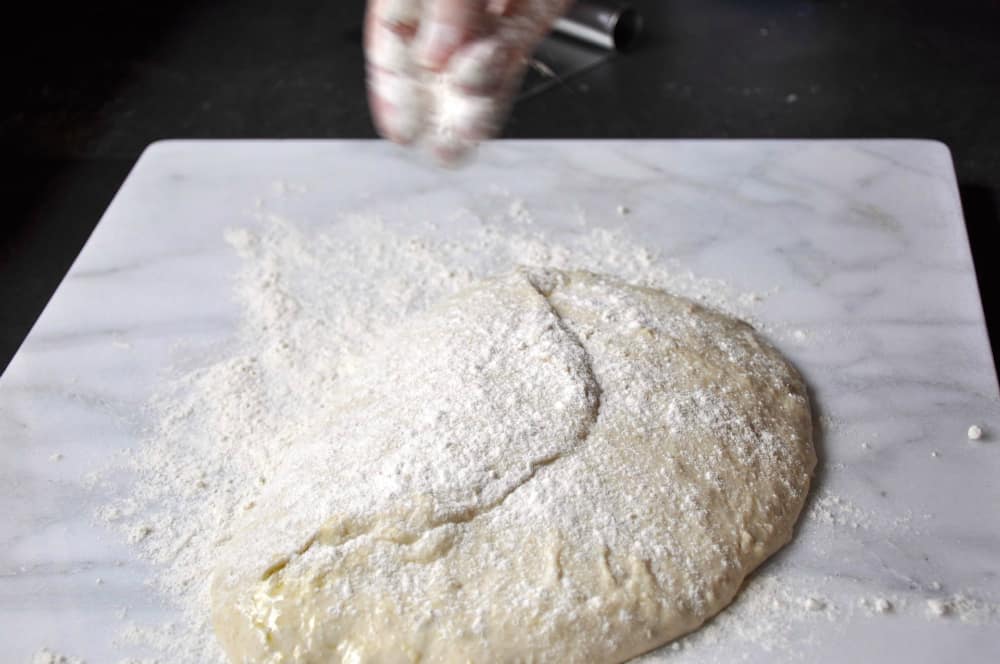
Step 4: Line a baking sheet with parchment paper and sprinkle with flour and cornmeal. Divide the dough into 12 equal pieces with a bench scraper. With the palm of your hand, roll each dough portion into a ball on floured surface and transfer to prepared baking sheet, giving each ball plenty of room to rise.



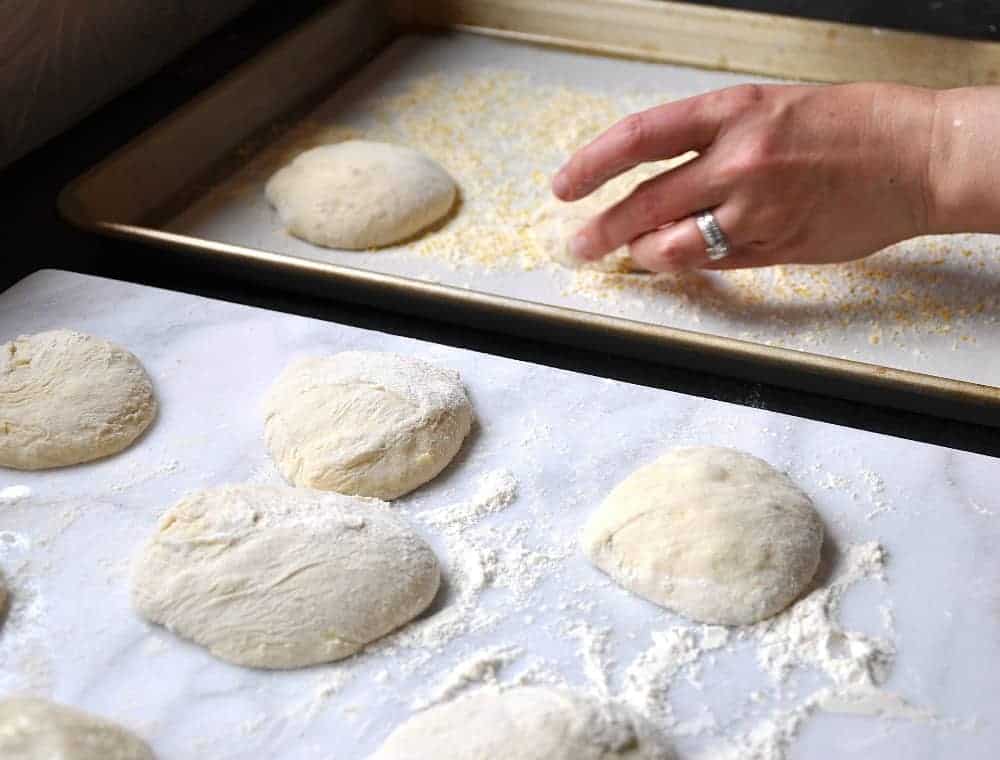
Step 5: Cover the dough balls with a clean kitchen towel and let rise until doubled in size. Bake for 8 minutes in a preheated 425°F oven, turn and bake 8-10 minutes more. Remove from oven and let cool for 30 minutes or more before slicing and toasting. Slather with butter and jam or, better yet, make English Muffin Breakfast Sandwiches!

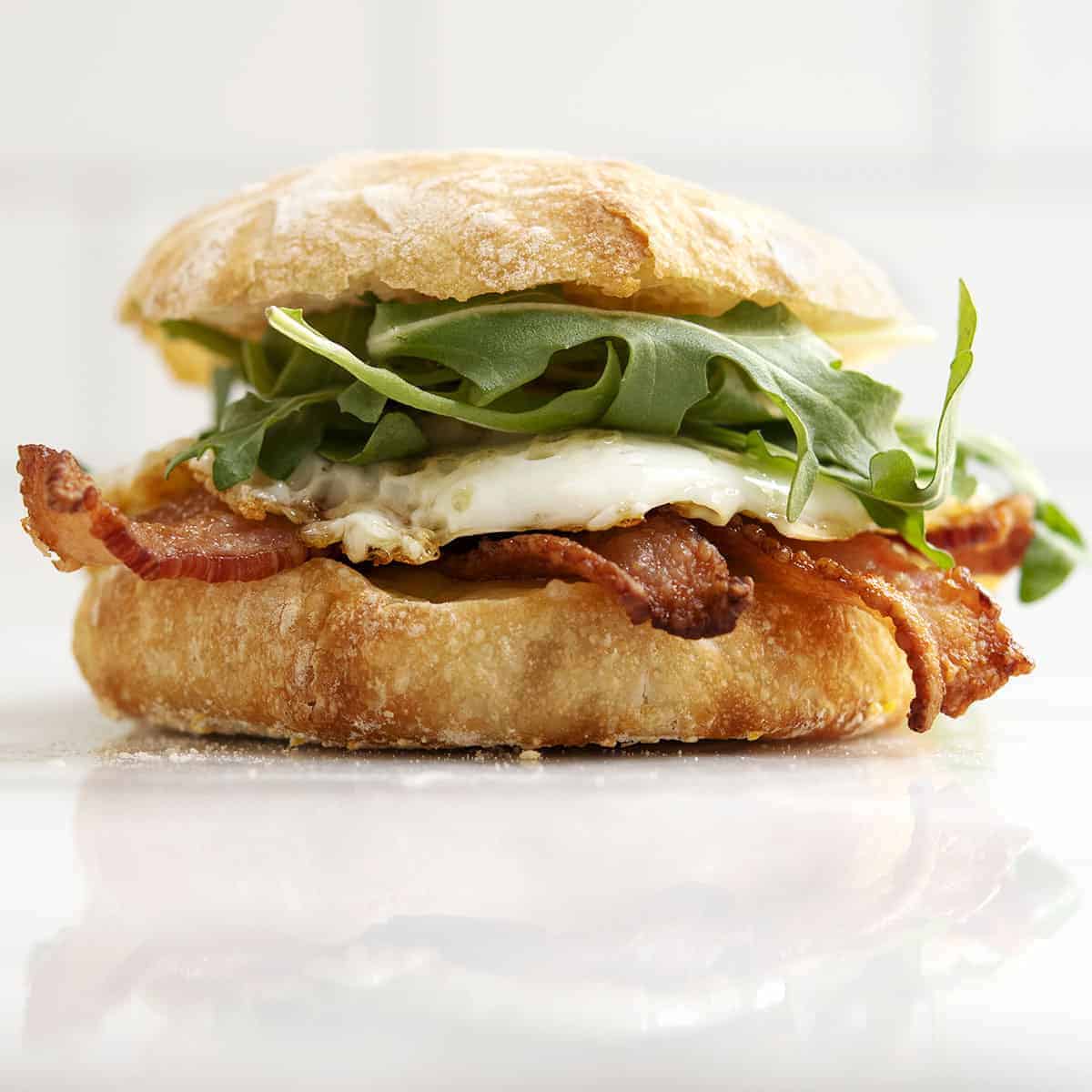
Special Equipment notes: a stand mixer, a kitchen scale and an instant read thermometer help tremendously with this English Muffin recipe.
English Muffin Recipe

Video
Ingredients
- 1 medium Yukon Gold potato 140-160 grams
- 1 1/3 cups water ~68°F, cool tap water
- 3 cups bread flour 418 grams
- 1/4 cup whole wheat flour 28 grams
- 1 tablespoon honey
- 2 1/2 teaspoons kosher salt
- 1 1/4 teaspoons active dry yeast
- 1/3 cup water ~68°F, cool tap water
- olive oil for your hands and the bowl
- 2 tablespoons all-purpose flour plus more for dusting work surface
- 2 tablespoons cornmeal
Instructions
- Scrub and then cut potato it into 1-inch chunks. Put potato into a small saucepan; cover with cold water. Bring to boil; reduce heat and simmer until the potato is tender, 10 to 12 minutes. Drain potato and transfer to a small bowl. Using a potato masher or fork, mash the potato. Scoop mashed potato into a 1/2 cup dry measure and place in refrigerator to cool. When potato is completely cool, begin dough.
- Pour the first portion (1 1/3 cups) of ~68°F warm water (use a thermometer to check) into bowl of a stand mixer fitted with the dough hook attachment. Add both flours, cooled potato, honey, salt and yeast. Mix on low speed for 10 minutes. At this point you should have a soft, sticky dough wraps around the dough hook. Scrape down sides of the bowl with a rubber spatula, and allow the dough to rest for 5 minutes.
- Once the dough has rested, turn mixer to medium speed and mix dough for another 2 minutes. With the mixer running, slowly add the second portion (1/3 cup) of ~68°F water about 2 tablespoons at a time. Be sure to wait until each addition of water is absorbed before adding more. When all of the water has been added, let the dough mix for another 2 minutes. Your dough should be smooth and shiny. Take the temperature of the dough with a kitchen thermometer; the dough must be between 75°F and 80°F.
- If the dough is cooler that 75°F, place it, covered, in a warm place for a little while and check the temperature again.
- Place the dough in an oiled large bowl. Roll and flip it over into a ball, then cover the bowl with plastic wrap. Place bowl in a room temperature (68-70°F) place and let rest for 30 minutes. After the 30-minute rest, it's time to “turn” the dough. Rub oil on your hands (the dough is sticky!) and reach to far side of the bowl, grasp the dough with your hands and pull straight up as far as the dough will stretch without breaking and fold the dough over itself. Give the bowl a quarter turn and repeat this process for a total of 4 times. Turn dough over, cover with plastic wrap, and let it rest at room temperature for another 30 minutes. Again, “turn” dough with oiled hands as described above, working your way around the circumference of the dough for a total of 4 times. Cover the bowl, return it to the room temperature place, and let it rest for an hour (which adds up to 2 hours total resting time). The dough should be sticky, bubbly, and active.
- At this point you can either finish making the English muffins in a single day or cover the bowl of dough with plastic wrap and refrigerate overnight.
- When you’re ready to shape and bake the English muffins, whisk together the 2 tablespoons flour, and 2 tablespoons cornmeal in a small bowl. Line two baking sheets with parchment paper and dust them with the flour-cornmeal mixture.
- Now place the dough on a generously floured work surface. With a floured metal bench scraper or floured knife, cut the dough into 12 equal pieces. To shape each muffin, roll each portion of dough firmly between the palms of both hands (you may need to flour your hands).
- Place 6 English muffins on each prepared baking sheet, leaving some room around each one and spacing them out evenly. Cover rolls of dough with clean kitchen towels (flour sack towels work wonderfully) and put them in a room temperature place until they have doubled in size, 1 hour to 1 hour and 45 minutes if the dough has not been refrigerated and 2 to 2 1/2 hours if it has.
- When the dough balls have doubled in size, they will feel a little less sticky to the touch. And when you press gently on the dough, it will feel light and airy, not dense and you may see some bubbles. Preheat oven to 425°F.
- Bake muffins for 8 minutes then remove pans from oven and flip each muffin over. Firmly pat each muffin with your hand to flatten it slightly–but do it quickly and be careful of the hot steam. Rotate pans and return to oven, switching them between the racks. Bake muffins until they are golden brown and baked through with a few browned patches, 8-10 minutes more (16-18 minutes total baking time).
- Remove pans from oven and cool on a wire rack for at least 30 minutes (torture!), then slice each English muffin in half crosswise and toast. Serve with butter and jam or better yet as a breakfast sandwich!
Notes
Nutrition
Nutrition information is automatically calculated, so should only be used as an approximation.














Why a Yukon gold potato? Could you use a russet potato instead of a Yukon gold?
Yukon Gold potatoes have a buttery flavor and creamier texture than russet potatoes, but you can use whichever you have on hand.